13 English universities in Moscow 2026
-
 from 150000.00 ₽ / year
from 150000.00 ₽ / year -

 RussiaMoscowCurrently watching: 2from 380000.00 ₽ / year
RussiaMoscowCurrently watching: 2from 380000.00 ₽ / year -

 RussiaMoscowCurrently watching: 2from 420000.00 ₽ / year
RussiaMoscowCurrently watching: 2from 420000.00 ₽ / year -
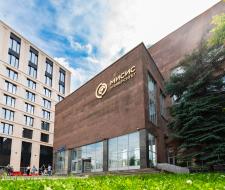 from 196000.00 ₽ / year
from 196000.00 ₽ / year -
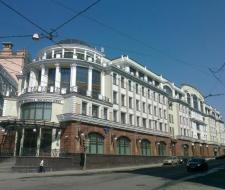 from 3900.00 $ / year
from 3900.00 $ / year -
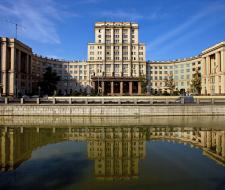 from 260000.00 ₽ / year
from 260000.00 ₽ / year -

-
 from 336000.00 ₽ / year
from 336000.00 ₽ / year -
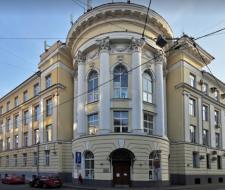 from 15000.00 ₽ / 60 lessons
from 15000.00 ₽ / 60 lessons -
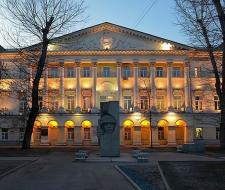
 RussiaMoscowCurrently watching: 1from 17000.00 ₽ / semester
RussiaMoscowCurrently watching: 1from 17000.00 ₽ / semester
In modern times, more and more Russian universities offer their students the opportunity to study in English. This education has many benefits that allow graduates to successfully build a career both at home and abroad.
English-language educational programs in Russian educational institutions have become available not so long ago. At first, they were separate courses, but then the first double-degree programs appeared, developed jointly with leading foreign universities. The main purpose of introducing English into the educational process was to develop linguistic and professional skills that significantly expand the opportunities for students to study educational materials, communicate with foreign teachers and students, and open up new prospects in the field of education and professional activity.
The growth in demand for English-language undergraduate programs is associated with an increase in the number of graduates of Russian schools who speak foreign languages at a high level. Modern applicants strive to get a higher education that meets Russian and international standards, and strive to build a successful international career.
Alternative destinations
Benefits of Studying in English at Moscow Universities
Studying in English offers a unique opportunity to gain international education without leaving Russia. Some universities, such as the British Higher School of Design or the International MBA Program at ION (Kingston/RANEPA), maintain direct partnerships with foreign institutions and are accredited by them to conduct joint programs. This allows students to access electronic resources from the partner foreign university and earn dual degrees upon graduation.
In many fields, research is primarily available in English. The Russian educational realm either lacks translations into Russian or doesn't prioritize them. A vast number of scientific publications in English are produced by researchers worldwide.
Learning in English allows students to benefit from the expertise of international educators, delve deeper into subjects, and stay abreast of contemporary scientific discussions, which may not yet be widespread in Russia due to limited resources. For a successful international science career and to apply international educational approaches, a high proficiency in English is vital.
Some English-taught programs differ from their Russian counterparts in teaching methods. Students familiar with the Western educational and work system acquire skills and knowledge valued by employers abroad and at foreign universities.
At certain institutions, special emphasis is placed on developing English language skills for professional purposes. Instructors are evaluated not just for their language proficiency and correct pronunciation, but also for their ability to engage in professional dialogue in English, teach, conduct research, and so on.
Studying in English involves interaction not only with international instructors but also with students from different countries. Interacting with peers from diverse cultures and languages can be crucial for Russian students, as it helps them develop intercultural communication skills and learn to connect in unfamiliar settings. In a globalized world, these skills are essential for those aiming to forge an international career or engage in research.
Another significant advantage of enrolling in an international program in Russia is the opportunity to obtain global education without leaving one's home country and without pausing one's career indefinitely.
Distinctive Features of Studying in English at Moscow Universities
Most programs taught in English are designed with future international careers in mind. In essence, they are oriented towards the humanities, encompassing fields like international relations, economics, politics, management, and law. These programs are ideal for those aiming for a transnational career, not just post-graduation, but right from the onset – from the moment they enroll at the university.
Many of these programs offer dual-degree formats, meaning they're organized in collaboration with a foreign university. Upon graduation, students receive two higher education diplomas, one of which is international. For instance:
- International Relations: HSE University + University of London
- Economics: HSE University + University of London
- Management and Economics in Business: RANEPA + University of Pisa
- Politics and Law: RANEPA + University of Valencia
- Politics and Law: RANEPA + University of Nice
- International Project and Program Management: RANEPA + University of Valencia
- Digital Governance: RANEPA + Kedge Business School
Moreover, there are stand-alone programs taught in English or other languages, such as:
- Politics and International Relations at MGIMO
- Economics and Management at RANEPA
- International Law at RANEPA
- Ecosystem Management at RANEPA
- International Humanitarian Cooperation at RANEPA
- Business, Culture, and European Languages at RANEPA
To apply for English-taught programs, applicants must provide their school diploma or degree, a motivational letter, and either IELTS or TOEFL certificates. Some universities do not require entrance exams for postgraduate programs, replacing them with an interview in English—often conducted as a video interview.
Top English-Taught Universities in Moscow
- British Higher School of Art & Design
- RANEPA (Russian Presidential Academy of National Economy and Public Administration)
- MISiS (National University of Science and Technology)
- HSE University (Higher School of Economics)
- Bauman Moscow State Technical University.
Top 14 best universities in Switzerland 2026
| 1 | Glion Institute of Higher Education Switzerland |
| 2 | Les Roches International School Montana |
| 3 | César Ritz Colleges Switzerland |
| 4 | IHTTI School of Hotel Management |
| 5 | Ecole Hoteliere de Lausanne |
| 6 | Geneva Business School |
| 7 | HIM Hotel Institute Montreux |
| 8 | Swiss Hotel Management School |
| 9 | Webster University Geneva |
| 10 | Business and Hotel Management School |
| 11 | Luzern IMI |
| 12 | Swiss Hotel Management School (SHMS) Caux |
| 13 | International University in Geneva |
| 14 | Culinary Arts Academy Switzerland |
Top 10 best universities in Netherlands 2026
Top 35 best universities and colleges in Canada 2026
| 1 | University of Toronto |
| 2 | McGill University |
| 3 | University of British Columbia |
| 4 | University of Alberta |
| 5 | Simon Fraser University |
| 6 | Montreal University |
| 7 | University of Windsor |
| 8 | York University |
| 9 | University of Guelph |
| 10 | McMaster University |
| 11 | University of Manitoba |
| 12 | University of Waterloo |
| 13 | Royal Roads University |
| 14 | Vancouver Film School |
| 15 | Kwantlen Polytechnic University |
| 16 | University of Calgary |
| 17 | Dalhousie University |
| 18 | Fanshawe College |
| 19 | University of Ottawa |
| 20 | Laval University |
| 21 | Sheridan College |
| 22 | University of Regina |
| 23 | Brock University |
| 24 | Thompson Rivers University |
| 25 | Humber College |
| 26 | Vancouver Island University |
| 27 | Mohawk College |
| 28 | Centennial College Toronto |
| 29 | Niagara College |
| 30 | Capilano University |
| 31 | Seneca College |
| 32 | Algoma University |
| 33 | Saint Clair College |
| 34 | Douglas College |
| 35 | LaSalle College |
